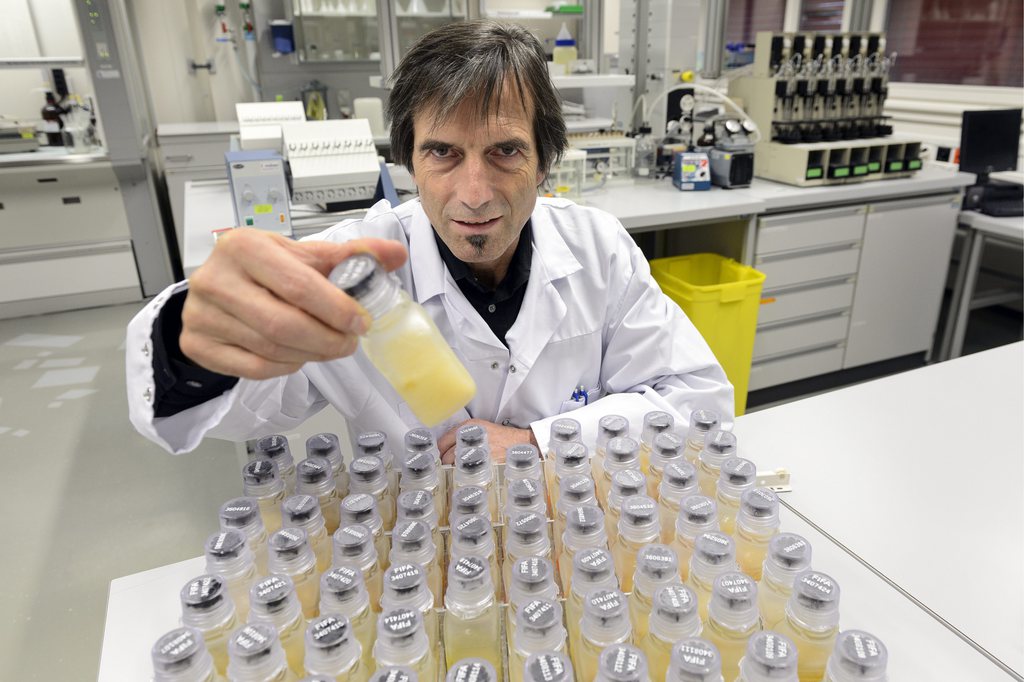‘Every footballer in Brazil will be tested’

Every one of the 736 players taking part in the football World Cup in Brazil will be checked for banned substances. The task of analysing the gallons of blood and urine has been given to the Swiss Laboratory for Doping Analyses (LDA).
The Lausanne-based lab was handed the mandate by football’s world governing body FIFA and the World Anti-Doping Agency (WADA) after the Ladatec laboratory in Rio de Janeiro had its accreditation taken away in August 2013 for not respecting intentional requirements set by WADA.
Ahead of the tournament, which kicks off on June 12, LDA director Martial Saugy told swissinfo.ch about the introduction of a biological passport and compares the situation in football with other sports. His laboratory started testing on March 3.
swissinfo.ch: The LDA has been working with FIFA since 1998. How entrenched is doping in football?
Martial Saugy: There are other sports which are more exposed because physical performance is the central factor. I’m thinking of cycling and athletics.
In general, sports featuring individuals are more exposed to doping than team sports. Given the speed at which information can travel nowadays, it seems to me it would be very difficult to set up an organised structure with which to dope an entire team. But an individual footballer could certainly take drugs.
FIFA takes the problem of doping seriously. Regional federations and organisations around the world, for example European footballing body UEFA, have always carried out a lot of tests. Football is at the top of WADA’s list of numbers of analyses.
What’s more, FIFA is currently shifting strategy slightly: it wants to implement “longitudinal” tests, in other words the introduction of biological passports and out-of-competition testing. UEFA already uses this method, as do other national federations.
swissinfo.ch: Few cases of doping have been reported in football. Is that because the tests are less strict and developed than in other sports?
M.S.: As I’ve said, there’s an evolution in the testing strategy. One could certainly have done better and define a cleverer strategy. But since the 2010 World Cup in South Africa, FIFA has clearly indicated to regional organisations that it plans to move towards out-of-competition testing.
On the other hand, the world of football isn’t completely wrong when it says that back when there was only urine testing during a tournament or at the end of a match the random element made it very risky for a player to take banned substances. The testing programmes – and I’m talking about Europe, which I know well – are applied very seriously.
swissinfo.ch: Which substances will you be paying closest attention to during this World Cup?
M.S.: All the substances listed by FIFA. Steroids are the main products used by athletes who dope, but they are less widespread in football. Then there are growth hormones, EPO [a performance-enhancer used by endurance athletes] and stimulants such as amphetamines.
But the main thing is to look for products which could have an influence on a tournament like this. I’m thinking in particular of testosterone – a product which enables you to recover better and which can be useful during a competition which lasts almost five weeks.
In 2012, more than 30 laboratories accredited by WADA analysed more than 260,000 specimens, 10% more than the previous year.
Of these, 4,723 shown atypical values or traces of banned substances (which doesn’t equal a violation of anti-doping rules). Anabolic steroids made up the most cases (2,279).
With 28,008 specimens, football was the most-tested sport. It was followed by athletics (27,836) and cycling (20,624).
For football, atypical values or traces of banned substances appeared in 315 cases. In athletics, this figure was 451 and cycling 502.
(Source: WADA)
swissinfo.ch: Suppose a famous player gets caught in the anti-doping web. Won’t there be pressure – from FIFA, national teams or clubs teams – to cover it up?
M.S.: The specimens we receive are marked by number not by name. So there’s total anonymity. That’s the rule and it’s very strict. A positive result would be sent not only to FIFA but also to WADA. If we didn’t do that, we’d lose all our credibility and our lab would be shut down overnight. This rule prevents any type of pressure on our laboratory.
However, we can’t simply close our eyes and say that every specimen is negative. At any moment WADA can throw in a positive specimen to check that we’re doing our job properly. So there’s a system of watching the lab to prevent any form of collusion with federations.
swissinfo.ch: So say a player tests positive – who is held responsible: the player or also the team doctor?
M.S.: The main responsibility is on the player – who by the way has the right to a counter-analysis. If the positive result is confirmed, the player will be disqualified and fined by FIFA. As part of its inquiry, FIFA will ask the player to make a statement. If the player maintains that the product had been prescribed to him by the doctor, FIFA and WADA could take measures against the doctor. If the doctor is proved to have been involved, he or she could also be punished. This procedure is written into the global anti-doping code, followed by FIFA.
swissinfo.ch: For the first time, players’ data will be used for biological passports. What will this tool do?
M.S.: Before the World Cup, every player will have taken a blood and urine test. We’re going to gather everything that is necessary to establish player databases. The biological passport is not limited to data such as the number of red corpuscles or haematocrit level – it also contains information held in urine. This enables us to create a sort of biological fingerprint for every player. Everyone is unique biologically – the aim of the biological passport is to ensure that each player maintains his particular biology. Rapid changes of certain parameters can indicate potential doping.
It’s the first time the principle of a biological passport has been applied in an almost systematic way to football. But we’re used to this work because the biological passport has been a reality for a long time in cycling and to an extent in athletics.
swissinfo.ch: Isn’t football a bit behind compared with other sports?
M.S.: Objectively, we know that in athletics and above all in cycling there has been and there still are serious problems with doping – notably concerning EPO. The introduction of the biological passport has been the best way to tackle this problem. The risk isn’t as great in football, but it exists.
There’s also the question of scale. There are about 800 professional cyclists; we’ve got almost that number at the football World Cup alone. Introducing a biological passport on the scale of cycling or athletics would require massive organisation. What’s more, there are other sports without biological passports, for example tennis and ice hockey.
In my view the anti-doping policy applied to football is consistent, bearing in mind the size of the sport and the risks.

In compliance with the JTI standards
More: SWI swissinfo.ch certified by the Journalism Trust Initiative











You can find an overview of ongoing debates with our journalists here . Please join us!
If you want to start a conversation about a topic raised in this article or want to report factual errors, email us at english@swissinfo.ch.